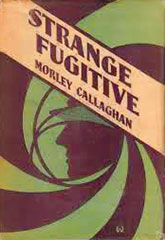Strange Fugitive
Critique • Quotes
 First edition
First editionFirst publication
1928
Literature form
Novel
Genres
Literary, crime
Writing language
English
Author's country
Canada
Length
approx. 82,000 words
Below the hard-boiled surface
Strange Fugitive is a strange novel for Morley Callaghan. It was his first and, judging by it at the time, you might have predicted Callaghan would become another James M. Cain (The Postman Always Rings Twice, Mildred Pierce), a writer of hard-boiled crime fiction based on shallow, self-centred characters.
Callaghan of course went on to produce entirely different kinds of novels and stories—intense works of conscience and of social and religious morality. Knowing this, one is led to look deeper into the seemingly superficial early work, a quest which is well repaid.
Far different from the earnest and tortured central characters later featured by Callaghan, Harry Trotter is a rough, oddly amoral figure who loses his foreman's job and his virtuous wife Vera on whom he had regularly cheated. He drifts into bootlegging and becomes a leading gangster in 1920s prohibitionist Toronto. This is when the city was derided as "Toronto the Good", but Trotter introduces Chicago-style gang warfare to the booze-running business.
Trotter is an uncomplicated strongman, who seizes what he wants, sleeps with whoever he feels like, wipes out competitors and never worries about the people he hurts. At least that's the picture on the surface. However, Trotter keeps thinking about getting back with Vera. His yearnings for her are self-absorbed, imagining how nice it would feel for him to tell her about his daily experiences. This and hints about his childhood relationship with his long-dead parents lead you to realize he is disturbed, though he is not introspective enough to realize this himself.
Hard edges
The point of view is always that of the unperceptive Trotter. As a result, the important themes of the story are revealed between the lines, by the reader connecting random thoughts. It's all bubbling beneath the factual surface.
This is also one of Callaghan's most sparsely written stories. The narrative is delivered matter-of-factly, without a lot of adjective and adverbs, and with long scenes of sharp dialogue without attribution. Again much like the hard-edged crime fiction being developed at the time.
The dispassionate tone of the reporting, the author's voice never supplanting his subject's and barely hinting at irony, makes this the closest Callaghan comes to adopting the style being propagated at the time by his modernist colleagues like James Joyce and Ernest Hemingway.
This is not to say his later works are inferior. He eventually finds his own style that diverges from the modernist trend. Those later heavy novels, most notably Such is My Beloved (1934) and More Joy in Heaven (1937), are accomplished in ways that are uniquely Callaghan. Perhaps the change came because the world itself changed from the oblivious Twenties to the dirty Thirties with its social upheavals.
But in Strange Fugitive, Callaghan is depicting an earlier world, an earlier sort of character, and it's thrilling for the perceptive reader.
True crime figures
For many years this was a difficult novel to find, going in and out of print several times. But in 2004 a new edition of Strange Fugitive was released with an introduction by James Dubro, a true crime writer and documentarian.
Dubro's research uncovered the real-life gang warfare taking place in Toronto and reported by the Toronto Star where Callaghan worked at the time—which obviously influenced the novelist. In fact, some of the novel's characters, including the anti-hero protagonist, were likely based on actual crime figures of the 1920s.
Dubro further places Strange Fugitive squarely in the hard-boiled crime tradition, the only other critic I had seen do so. He argues Callaghan's first novel may have been one of the first in this genre—"establishing the gangster novel in North America and the urban novel in Canadian literature".
— Eric
Critique • Quotes

